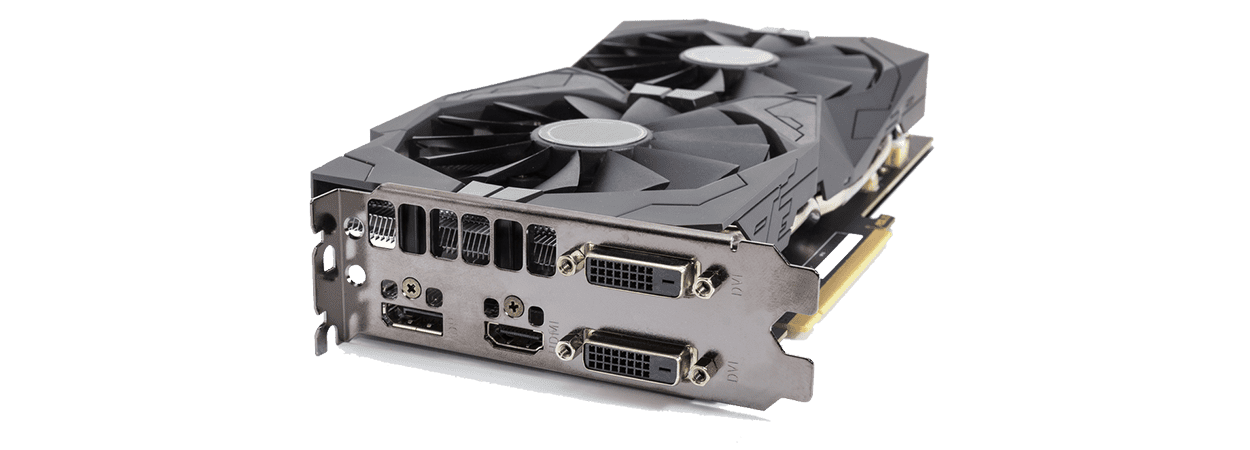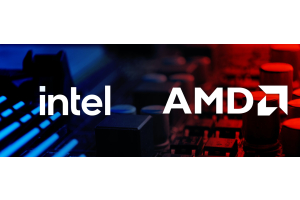We use cookies to offer you a better experience. For more information on how we use cookies you can read our Cookie and Privacy Policy.
How to Pick the Best GPU for Gaming
October 02, 2018

There are several components that go into creating the best gaming experience, but few are more important than your computer’s graphics processing unit (GPU), also known as a graphics card or video card.
While the best available options will make your games run smoothly, lower quality cards will cause more frustration than they’re worth. But with the options available now, it can be a bit more complicated for gamers to find the right card for their systems and for their budgets. This also becomes more complex if you choose to build your own gaming PC.
You may be worried about running into issues with compatibility and whether you’re choosing the right card for the games you frequently play. Because the graphics card you purchase will likely be the most expensive component of your computer, it’s crucial that you know you’re making an informed decision.
Here are some tips for finding the best video card for gaming.
The importance of a quality graphics card
Modern video games rely on providing an immersive world, which is basically impossible without a graphics card. While some games (mostly much older titles) can run without a card by only utilizing the processor (CPU), even they may not run how you want them to.
A graphics card takes considerable pressure off your CPU and controls the images from your computer before they appear on your display. For the best possible performance - and particularly when playing modern games - a graphics card is an absolute must. Most modern games are so advanced that it can be impossible to play them without a graphics card.
In the future, most games will require you to have some kind of graphics card available, especially as more triple-A (AAA) games are designed for 4K monitors. Even if you’re a casual gamer or someone who plays titles that are less graphics-intensive, it’s worth considering upgrading your GPU or getting a dedicated card.
Stick to a budget
While graphics cards can be pricey, investing in a more powerful solution means it’s unlikely that you will need to upgrade in the next few years. That said, new technology can throw a wrench into which options may suit your needs.
For example, in August NVIDIA® released a new series of graphics cards, which are available in HP NVIDIA desktops and popular HP NVIDIA gaming PCs that offer a superior experience for a reasonable price. These cards include the GTX 1050 and the GTX 1080 Ti. They have also taken the leap into 4K, meaning that a whole new world is open for casual gamers and professionals alike.
If in doubt, it doesn’t hurt to save up for the best graphics card you can get. The initial cost may be high, but having a budget and a clear idea of what you need to spend for quality can help you to determine how much you need to save up in order to get what you want and will enjoy using for some time.
Research the games you plan to play
Before picking a card, it’s smart to know which types of games you’ll play. As a casual gamer playing less intense games, an integrated graphics card may do the job.
If you can spend a little extra money though, even a $150 dedicated graphics card can go a long way toward making images crisp and fluid. Even so, you might have a bit more trouble running more complex games with a card at that price point.
For around $300, you can purchase a graphics card that can run games on their medium or high setting at a higher resolution. This is a solid compromise for those who do not want to spend a lot of money but who want an upgraded experience similar to, or sometimes better than, gaming consoles.
Some of the most recommended cards in this price tier include the NVIDIA GeForce® GTX 1060 and the AMD Radeon™ RX580.
Of course, the high-end options offer the best frame rates and overall performance. For $500 and higher, your setup will run almost any game at any resolution. It may be one of the most expensive options available at $1,200, but the NVIDIA GeForce RTX 2080 Ti will run the most intense games for some years to come.
Again, it all boils down to what games you want to play and which resolution they require for the best performance.
As the gaming world begins transitioning to 4K, you may want to keep this in mind if you’re looking for a graphics card that won’t be underpowered in a year or two. You’ll also need an appropriate display option, which we’ll discuss shortly.
Also remember that if , you can customize other aspects that can help a lower-quality graphics card perform better, such as the type and speed of processor you choose. Typically, a four-core processor such as the Intel® Core™ i7 should be enough to run any graphics card you pick just fine.
Know your screen size
You can have the best graphics card available, but if you don’t have the proper monitor to go with it, the results won’t look how you want them to. Most gamers probably own a standard monitor that provides a 1366 x 768-pixel resolution, although more and more gamers and power users are switching to 4K options (3840 x 2160 pixels).
In order to truly enjoy the benefits of a new graphics card, you may also have to upgrade your display within the next few years. The opposite is true, too, because if you’re considering a new monitor, you should also think about which graphics card will end up working with your system.
It’s likely that 4K will become the new standard in the near future, so if you go that route, you may want to choose a card that will work with your new 4K gaming monitor. Some newer cards from NVIDIA and AMD feature G-Sync or FreeSync technology, respectively, and this feature offers faster refresh rates meant for 4K resolution.
Your decision, of course, depends on your budget and whether you’re willing to spend money for both a new graphics card and a monitor. However, you can choose to upgrade one component and then another down the line when it works for your budget. At some point, though, you will need a display that properly reflects the graphics card you purchased.
In summary
A graphics card can make or break your PC gaming experience, whether you’re into solo RPG games or you love playing online multiplayer games.
They may be a bit on the pricey side, but a good graphics card can take your gaming experience to the next level. By sticking to the budget that works for you, you can find an option that will allow you to play your favorites.
Related articles:
- HP OMEN Gaming Computers Review - meet HP®'s premium gaming PC family
- HP OMEN PC Gaming vs Console Showdown - how graphics compare from PC to console
About the Author: Daniel Horowitz is a contributing writer for HP® Tech Takes. Daniel is a New York-based author and has written for publications such as USA Today, Digital Trends, Unwinnable Magazine, and many other media outlets.
Article reposted with permission from HP Tech Takes






